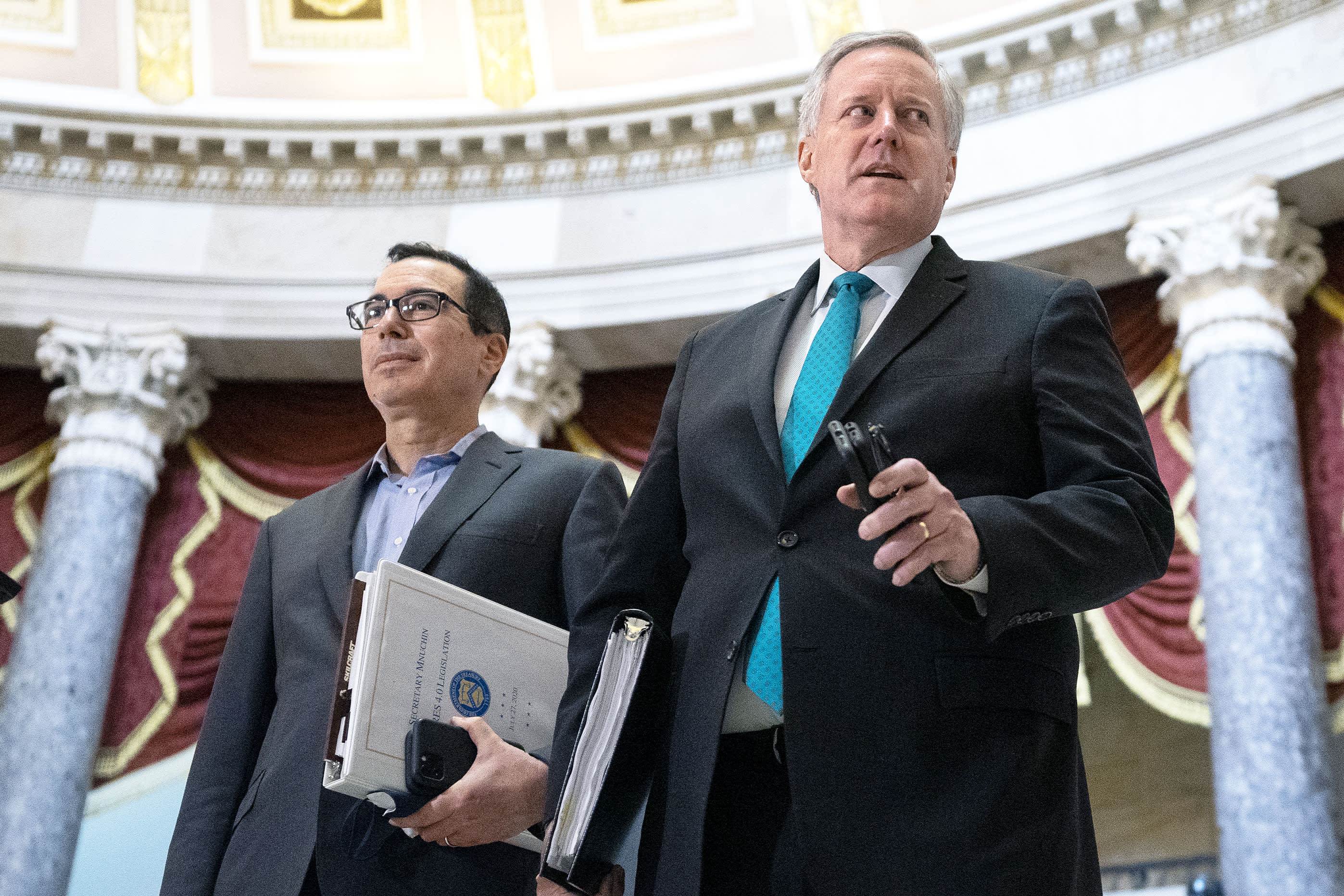Mark Meadows, White House chief of staff, right, and Steven Mnuchin, U.S. Treasury secretary, speak to members of the media following a meeting at the U.S. Capitol in Washington, D.C., on Saturday, Aug. 1, 2020.
Stefani Reynolds | Bloomberg | Getty Images
Democrats and Trump administration officials will sit down again Monday afternoon to try to hammer out an elusive deal on a fifth coronavirus aid bill.
Negotiators House Speaker Nancy Pelosi, D-Calif., Senate Minority Leader Chuck Schumer, D-N.Y., Treasury Secretary Steven Mnuchin and White House chief of staff Mark Meadows planned to meet at 1 p.m. ET as the sides find themselves far from an agreement. The discussions will follow Sunday’s staff-level talks on a package to help rein in a raging pandemic and jolt a flailing U.S. economy.
The effort has gained urgency after a $600 per week federal unemployment benefit expired at the end of July. The extra aid has helped tens of millions of jobless people afford food and housing as the economy reels during the outbreak.
Pelosi has indicated the sides made more progress in talks over the weekend than they did in discussions last week. Asked Monday how far apart Democrats and Republicans are, the speaker said she would wait to see how the day’s talks go.
“Well, let’s see when we meet today,” she told CNN. “It’s absolutely essential that we reach agreement.”
Disagreements over how to structure unemployment insurance have stood in the way of a deal. Democrats have insisted on continuing the $600 weekly sum. They passed a House bill in May to extend the aid into next year.
Republicans, who questioned the need for more pandemic relief before they released a proposal last week, want to slash the extra benefit to $200 per week through September. They would then set the aid at 70% wage replacement.
Pelosi insisted Monday that she wants to keep the additional insurance at $600 per week, at least until state unemployment rates start to fall.
“As the unemployment goes down, the number can go down,” she told CNN.
Unemployment insurance is not the only area where Democrats and Republicans need to hash out differences. Democrats oppose liability protections for corporations. Senate Majority Leader Mitch McConnell, R-Ky., has said a bill will not pass the Senate if it does not include legal immunity for businesses, doctors and schools.
Democrats have pushed for nearly $1 trillion in aid for cash-strapped states and municipalities. The GOP plan did not include direct relief funds for state and local governments, but would give them more flexibility in how they spend money approved earlier this year.
Pelosi has also called for more funds to help schools reopen than the $105 billion proposed by Republicans. She has criticized the GOP for tying much of the money to schools physically holding classes in the fall even as the pandemic spreads.
The sides do agree on the need to send another round of direct payments of up to $1,200 to Americans, Mnuchin said Sunday.
Unless negotiators can strike an agreement Monday, it appears unlikely Congress can pass an aid bill before next week at the earliest. Meadows sounded doubtful about a quick resolution on Sunday.
“I’m not optimistic that there will be a solution in the very near term,” he told CBS.
Republicans, who did not start negotiating with Democrats until days before the extra unemployment insurance expired, have offered a temporary extension while the sides reach a broader deal. Pelosi has rejected offers of a short-term bill, contending Congress cannot combat the outbreak in a “piecemeal” fashion.
The inability to find consensus comes as the U.S. struggles to contain the coronavirus. The country has now reported nearly 4.7 million Covid-19 cases and more than 154,000 deaths due to the disease, according to data compiled by Johns Hopkins University.
Meanwhile, the latest monthly jobs report due Friday will show how states dialing back their reopening plans in July affected the job market.
On Monday, Pelosi again accused her Republican counterparts of lacking the needed urgency to address the crisis.
“A building is on fire and they’re deciding how much water they want to have in the bucket,” she told CNN.
